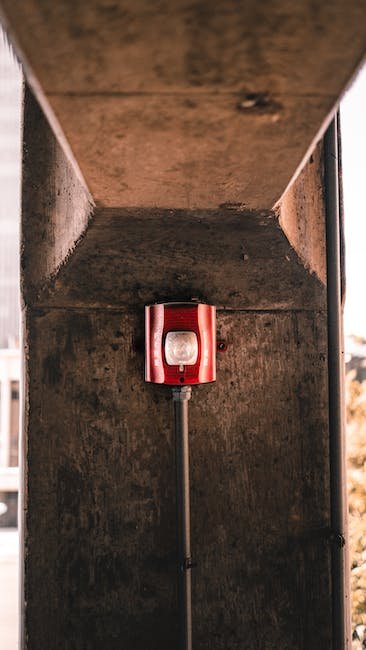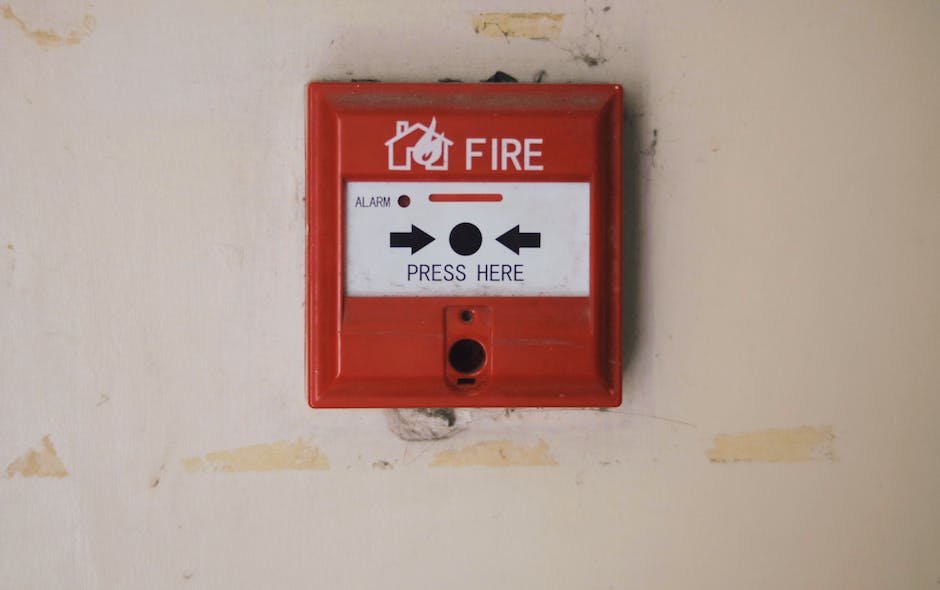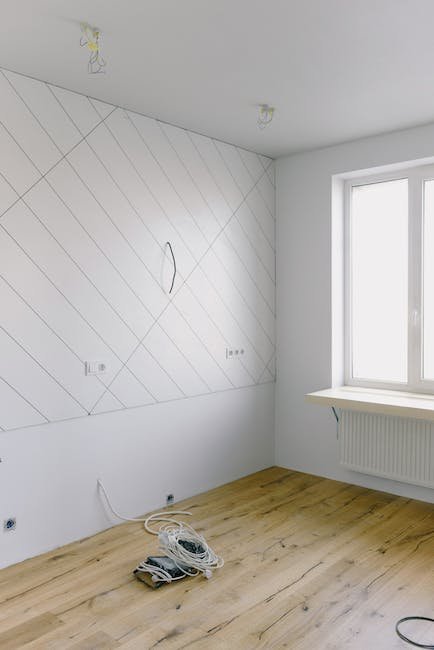Now Reading: How to Set Up a Perimeter Alarm System
-
01
How to Set Up a Perimeter Alarm System

How to Set Up a Perimeter Alarm System
Picture this: You’re lying in bed, blissfully unaware, immersed in a deep sleep. Outside, the world is cloaked in darkness, when suddenly a twig snaps, shattering the silence. Somewhere along the edges of your property, a trespasser is lurking, breaching the sanctuary of your domain. But fear not, for within the boundaries of your imagination lies the solution – a robust perimeter alarm system. In this article, we will delve into the captivating realm of setting up a perimeter alarm system, equipping you with the knowledge and tools to safeguard your fortress. Whether you are a vigilant homeowner seeking peace of mind or a business owner safeguarding your valuable assets, join us in unraveling the secrets behind the construction of a formidable defense line.
Table of Contents
- Choosing the Right Perimeter Alarm System for Your Property
- Understanding the Essential Components of a Perimeter Alarm System
- Step-by-Step Guide to Installing a Perimeter Alarm System
- Optimizing the Performance of Your Perimeter Alarm System
- Recommended Best Practices for Maintaining Your Perimeter Alarm System
- Q&A
- Wrapping Up

Choosing the Right Perimeter Alarm System for Your Property
When it comes to protecting your property, a reliable perimeter alarm system can be your first line of defense. But with so many options available, how do you choose the right one? Here are a few factors to consider:
- Size and layout of your property: Determine the coverage area you need. If you have a large estate, you may require multiple sensors and detectors placed strategically around your perimeter.
- Level of sensitivity: Consider the sensitivity level needed for your property. Some alarm systems have adjustable settings, allowing you to customize the response threshold based on your specific requirements.
- Wired or wireless system: Decide whether you prefer a wired or wireless alarm system. Wireless systems offer easier installation and flexibility, while wired systems may provide a more stable and reliable connection.
- Integration with other security measures: If you have existing security measures in place, such as CCTV cameras or access control systems, choose an alarm system that seamlessly integrates with them.
Remember, investing in a high-quality perimeter alarm system is essential for the safety and security of your property. By considering these factors and consulting with security professionals, you can ensure that you make an informed decision to protect your assets and have peace of mind.

Understanding the Essential Components of a Perimeter Alarm System
When it comes to safeguarding your property and ensuring the utmost security, a perimeter alarm system plays a vital role. This sophisticated system comprises several essential components that work seamlessly together to create a robust defense line against unauthorized access. Let’s delve into the key components that constitute a dependable perimeter alarm system:
1. Sensors
Sensors are the frontline warriors of any perimeter alarm system. These cutting-edge devices come in various forms such as infrared, microwave, or acoustic sensors and act as the first line of defense against intruders. They constantly monitor the surrounding areas, detecting any movement or abnormal activity.
2. Control Panel
The control panel acts as the brain of the entire alarm system, receiving signals from the sensors and initiating the appropriate response. It collects and processes the data and triggers the necessary actions, such as activating alarms, contacting security personnel, or notifying the homeowner.
3. Alarms and Notifications
The primary purpose of a perimeter alarm system is to alert the authorized individuals about potential breaches. This is where alarms and notifications come into play. Whether it’s a piercing siren, flashing lights, or alerts on mobile phones, these audible and visual cues serve as a deterrent for intruders and ensure that immediate action can be taken.
A strong and reliable perimeter alarm system relies on the effective integration of these essential components. By investing in a well-designed system, you can rest assured knowing that your property is well-protected and secured from potential threats.

Step-by-Step Guide to Installing a Perimeter Alarm System
Installing a perimeter alarm system can provide an added layer of security to your property, giving you peace of mind and deterring potential trespassers. Here is a step-by-step guide to help you effortlessly install your own perimeter alarm system.
1. Determine the perimeter: Start by identifying the boundaries of your property. Walk around and assess the areas where you want to install the alarm system. Consider entrances, windows, and any vulnerable spots that need increased protection.
2. Choose the right equipment: Research and select a reliable perimeter alarm system that suits your specific needs. Keep in mind factors such as range, sensitivity, wireless connectivity, and extra features like smartphone integration for remote monitoring.
3. Strategically position the sensors: Now, it’s time to place the sensors strategically. Install the sensors on external walls, fences, or other suitable locations. These sensors will detect any unauthorized entry or movement near the perimeter and send alerts when triggered.
4. Connect the control panel: Ensure your control panel is easily accessible and within the range of your sensors. Connect it to a power source and follow the manufacturer’s instructions to set it up. Many alarm systems also require a battery backup in case of power failure.
5. Configure and test the system: Set up the system according to the specific instructions provided by the manufacturer. This may involve programming the control panel, adjusting sensor sensitivity, and setting up any desired notifications. Once configured, test the system to ensure it operates correctly.
6. Integrate additional security measures: Consider integrating additional security measures like CCTV cameras or motion-activated lights to enhance the effectiveness of your perimeter alarm system. These extra layers of protection can further deter potential intruders.
Remember, each alarm system may have its own unique installation requirements, so always refer to the manufacturer’s instructions. By following this step-by-step guide and customizing it to your specific needs, you can successfully install a reliable and effective perimeter alarm system to safeguard your property.
Optimizing the Performance of Your Perimeter Alarm System
When it comes to protecting your property, a well-functioning perimeter alarm system is essential. It acts as the first line of defense and ensures that any unauthorized access is detected promptly. To ensure optimal performance and maximum effectiveness, here are a few tips to optimize your perimeter alarm system:
- Regular system maintenance: Just like any other electronic device, your perimeter alarm system requires regular maintenance to operate at its best. Schedule routine inspections to check for any loose connections, damaged wiring, or faulty components. Keep the system clean from any debris or obstructions that may interfere with its sensors or detectors.
- Smart sensor placement: Placement of sensors is critical to the overall efficiency of your system. Ensure they are strategically positioned to cover all vulnerable areas, such as entry points, windows, and blind spots. Consider the layout of your property and any potential obstacles that may affect sensor accuracy. Regularly test and calibrate sensors to maintain their accuracy and reduce false alarms.
- Backup power supply: Power outages can leave your property vulnerable. To avoid a lapse in security during these times, it’s important to have a reliable backup power supply for your perimeter alarm system. Invest in a backup battery or uninterruptible power supply (UPS) to ensure continuous operation even during electrical outages.
Remember, the optimization of your perimeter alarm system is crucial for maintaining a safe and secure environment. By implementing regular maintenance, strategic sensor placement, and backup power solutions, you can enhance the effectiveness of your system and enjoy the peace of mind that comes with robust security.
Recommended Best Practices for Maintaining Your Perimeter Alarm System
Maintaining a reliable perimeter alarm system is crucial for the security and protection of your property. To ensure optimal performance and effectiveness, here are a few recommended best practices:
Regular Inspections:
- Perform routine inspections of your alarm system components to check for any signs of damage, wear, or malfunction.
- Verify that all sensors, cameras, and wiring are properly aligned, mounted, and functioning as intended.
- Regularly test the system’s functionalities, including its responsiveness to trigger events and the accuracy of notifications.
Battery Maintenance:
- Keep a close eye on the battery levels of your alarm system. Replace them as recommended by the manufacturer.
- Ensure that backup batteries, if applicable, are fully charged and in good working condition.
- Regularly clean battery terminals to prevent corrosion, ensuring a reliable power source for your alarm system.
Upgrade and Update:
- Stay up to date with the latest firmware and software releases for your perimeter alarm system.
- Consider upgrading older components or adding new technology to enhance system capabilities and keep up with evolving security standards.
- Regularly review and update user access permissions, passwords, and security protocols to prevent unauthorized access.
By adhering to these recommended best practices, you can ensure that your perimeter alarm system remains dependable, enabling you to maintain peace of mind and safeguard your property effectively.
Q&A
Q: What is a perimeter alarm system and why would I need one?
A: A perimeter alarm system is a security system that is designed to protect the outer boundaries of your property. You would need one to add an extra layer of security to your home or business and deter potential intruders.
Q: What are the essential components of a perimeter alarm system?
A: The essential components of a perimeter alarm system include sensors, such as motion detectors or infrared sensors, a control panel, and an alarm. Some systems may also include cameras for added security.
Q: How do motion detectors work in a perimeter alarm system?
A: Motion detectors use sensors to detect movement within their range. When motion is detected, they send a signal to the control panel, which triggers the alarm. They are an effective way to detect intruders before they reach your property.
Q: Can I install a perimeter alarm system myself or should I hire a professional?
A: While it is possible to install a basic perimeter alarm system yourself, it is recommended to hire a professional, especially for more complex systems. Professionals can ensure proper installation, provide guidance on system placement, and optimize the system for maximum security.
Q: What are some additional features I should consider for my perimeter alarm system?
A: Some additional features to consider for your perimeter alarm system may include remote monitoring capabilities, integration with smart home devices, wireless connectivity, and the ability to customize the system based on your specific security needs.
Q: How do I maintain my perimeter alarm system?
A: To maintain your perimeter alarm system, regularly check the sensors and connections for any signs of damage or malfunction. Keep batteries in motion detectors and other wireless components fresh. Additionally, ensure that your system is regularly serviced by a professional to address any potential issues.
Q: Are there any downsides to using a perimeter alarm system?
A: While perimeter alarm systems are an effective security measure, some downsides may include false alarms triggered by pets or wildlife, cost of installation and maintenance, and the need for occasional adjustments to avoid false alarms caused by environmental factors.
Q: Can a perimeter alarm system be integrated with other security measures?
A: Absolutely! Perimeter alarm systems can be integrated with other security measures such as CCTV cameras, access control systems, or even outdoor lighting. This integration provides a comprehensive security solution for your property.
Wrapping Up
As we bid farewell to the realm of unruly intruders and potential security breaches, it’s time to conclude our journey of establishing a formidable fortress with our perimeter alarm system. With a dash of creativity and oodles of determination, you are now equipped to guard your sanctuary like an intrepid guardian of the night.
Remember, setting up a perimeter alarm system is not just about a labyrinth of sensors and wires; it’s about creating an impenetrable shield that puts your mind at ease. As you take your final steps, weaving the invisible threads of protection around your domain, take pride in the knowledge that you are one step closer to absolute security.
Whether you choose the classic elegance of infrared beams or the cutting-edge allure of wireless technology, each step you have taken has paved the way to tranquil serenity. Embrace the satisfaction of knowing that no shadow will go unnoticed, no uninvited footsteps will be left unheard.
As our odyssey draws to a close, let us remind ourselves that the pursuit of safety and peace of mind is an ongoing endeavor. Routine maintenance, periodic testing, and continuous refinement are the unseen guardians that will ensure your alarm system remains ever vigilant.
Now, it is time for you to stand on the threshold of your fortified haven, surveying the vast expanse of its protected boundaries. With your perimeter alarm system as your loyal ally, you can breathe a sigh of relief, knowing that intruders will cower in the face of your resolute defense.
So, go forth and cherish the tranquility that accompanies a properly fortified perimeter. May your castle remain strong, your sanctuary secure, and your nights filled with uninterrupted bliss.
As an affiliate, my content may feature links to products I personally use and recommend. By taking action, like subscribing or making a purchase, you’ll be supporting my work and fueling my taco cravings at the same time. Win-win, right?
Want to read more? Check out our Affiliate Disclosure page.





